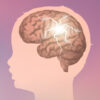New research explores the brain changes occurring among cosmonauts during their long-duration spaceflight.
According to a study in Frontiers in Neural Circuits, cosmonauts experience microstructural changes in numerous white matter tracts, including the corpus callosum, arcuate fasciculus, corticospinal, corticostriatal, and cerebellar tracts.
“Twelve cosmonauts who spent an average of six months aboard the International Space Station (ISS) were scanned in an MRI scanner pre-flight, ten days after flight, and at a follow-up time point seven months after flight,” the authors explained in their findings.
The authors also mentioned: “We performed differential tractography, a technique that confines white matter fiber tracking to voxels showing microstructural change.”
“We found significant microstructural changes in several large white matter tracts, such as the corpus callosum, arcuate fasciculus, corticospinal, corticostriatal, and cerebellar tracts.”
The new findings may serve as a basis for future research exploring brain changes, such as rewiring, during space exploration.


